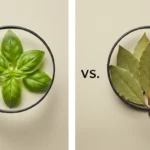Eight years of coaxing life from soil has taught me a thing or two, but nothing quite prepared me for the day my cat, Whiskers, decided my prized basil plant was his personal salad bar. As Kalsoom Imran, a gardener, I was amused, then concerned – is basil bad for cats?
Can Cats Eat Basil? Understanding the Basics
Is Basil Toxic to Cats? The Short Answer
Okay, let’s get right to it. You’re probably here because you’ve got a curious kitty who’s taken a liking to your herb garden, or maybe you’re just a super-responsible pet parent. So, the big question: is basil toxic to cats? The short answer is, thankfully, no. Basil isn’t considered inherently poisonous to our feline friends. That’s a relief, right? But before you start tossing basil sprigs at your cat, there’s more to the story.
Is Basil Safe for Cats to Consume? What You Need to Know
While basil isn’t toxic, that doesn’t automatically make it a free-for-all snack for your cat. Just because something isn’t poisonous doesn’t mean it’s necessarily good for them. The real question is, is basil safe for cats to consume in any amount? It’s more nuanced than a simple yes or no. We need to consider things like quantity, individual cat sensitivities, and the potential for digestive upset.
So, while a tiny nibble probably won’t send your cat into a crisis, we need to understand the potential risks involved.
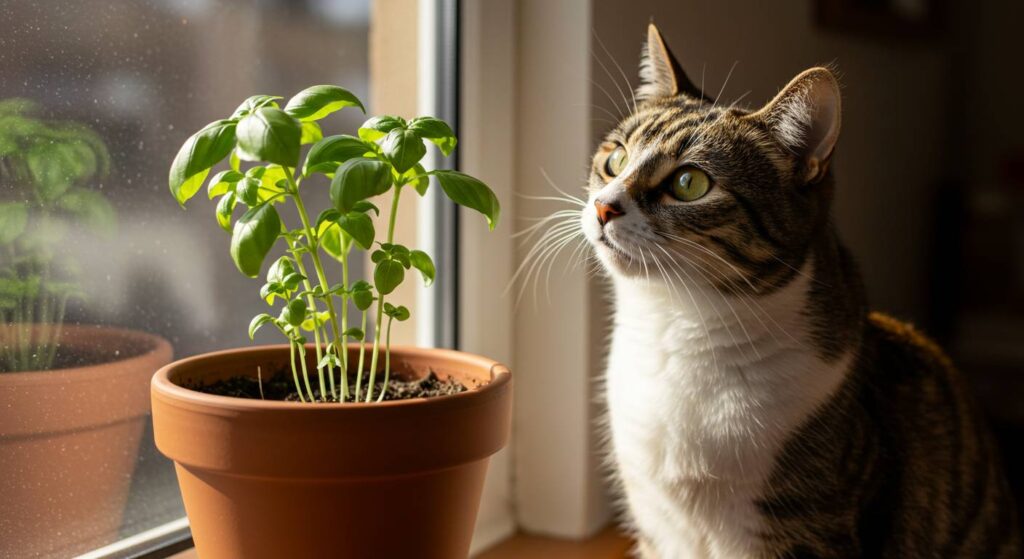
Basil and Cats Safety: A Deeper Dive
Is Basil Harmful for Felines? Potential Risks
So, if it’s not technically toxic, why all the fuss? Well, the concern isn’t about outright poisoning, but rather about potential harm. Is basil harmful for felines in other ways? Yes, it can be. The biggest issue is that cats’ digestive systems are quite different from ours. They’re obligate carnivores, meaning their bodies are designed to process meat, not a lot of plant matter.
While a small amount of basil might not cause a major problem, a larger quantity could lead to digestive upset, like vomiting or diarrhea.
Basil Dangers for Cats: What to Watch Out For
Okay, so we know it’s not a deadly poison, but what are the real basil dangers for cats that we should be aware of? Beyond the digestive issues, some cats might have sensitivities or allergies to certain plants, including basil. This could manifest as skin irritation, itching, or even respiratory issues in rare cases. It’s important to be observant and note any unusual changes in your cat’s behavior or physical condition after they’ve been around basil.
Risks of Basil for Cats: More Than Just Toxicity
The risks of basil for cats extend beyond just the immediate physical reactions. Think about it: if your cat isn’t feeling well because of something they ate, they might become lethargic, lose their appetite, or even become dehydrated. These secondary effects can be just as concerning as the initial upset. So, even though basil isn’t a “toxic” substance, it can still indirectly cause problems for your furry friend.
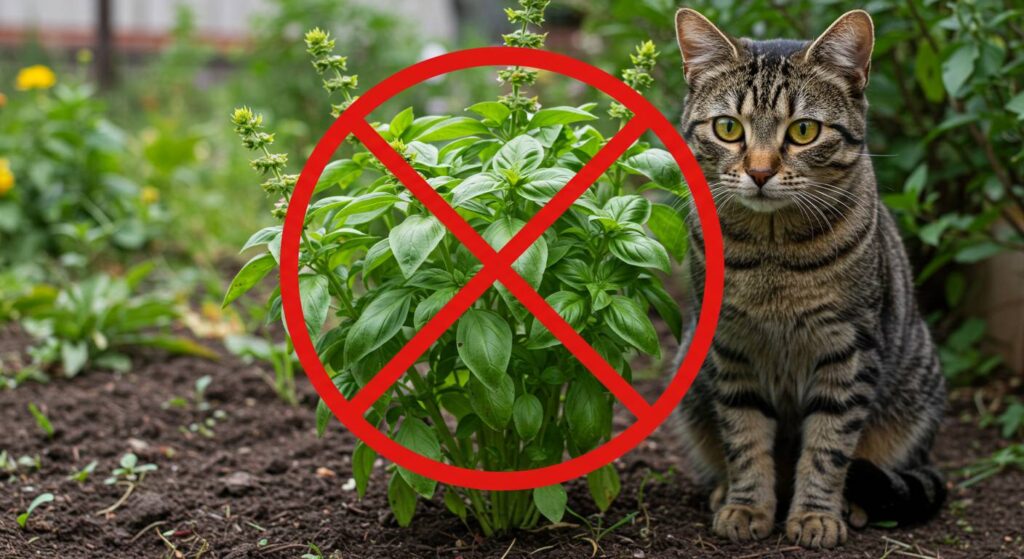
Effects of Basil on Cats: What Happens if Your Cat Eats Basil?
Cat Ate Basil: What Should You Do?
Alright, so your cat decided to sample your basil plant. Don’t panic! The first thing to do if your cat ate basil is to assess how much they consumed. A tiny nibble is probably nothing to worry about. However, if they’ve eaten a significant amount, it’s wise to keep a close eye on them. Monitor their behavior, look for any signs of discomfort, and be ready to contact your vet if anything seems off.
Cat Reaction to Basil: Signs to Look For
What exactly should you be looking for? The cat reaction to basil can vary, but some common signs include vomiting, diarrhea, loss of appetite, lethargy, or excessive drooling. If you notice your cat is scratching more than usual, or has any skin redness, that could also be a sign of a reaction. It’s all about being observant and knowing your cat’s normal behavior.
Basil Poisoning in Cats: Recognizing the Symptoms
While true “basil poisoning” is unlikely, it’s still important to recognize the signs of a severe reaction. Symptoms of what might be called basil poisoning in cats could include persistent vomiting or diarrhea, difficulty breathing, tremors, or seizures. If you see any of these severe symptoms, it’s crucial to seek immediate veterinary care. Don’t wait to see if it gets better on its own.
Adverse Effects of Basil on Cats: Beyond Immediate Reactions
The adverse effects of basil on cats can sometimes extend beyond the immediate few hours after ingestion. For example, repeated bouts of digestive upset can lead to dehydration, which can be especially dangerous for kittens or older cats. It’s also important to remember that every cat is different, and some may be more sensitive than others. So, what’s mild for one cat could be more problematic for another.
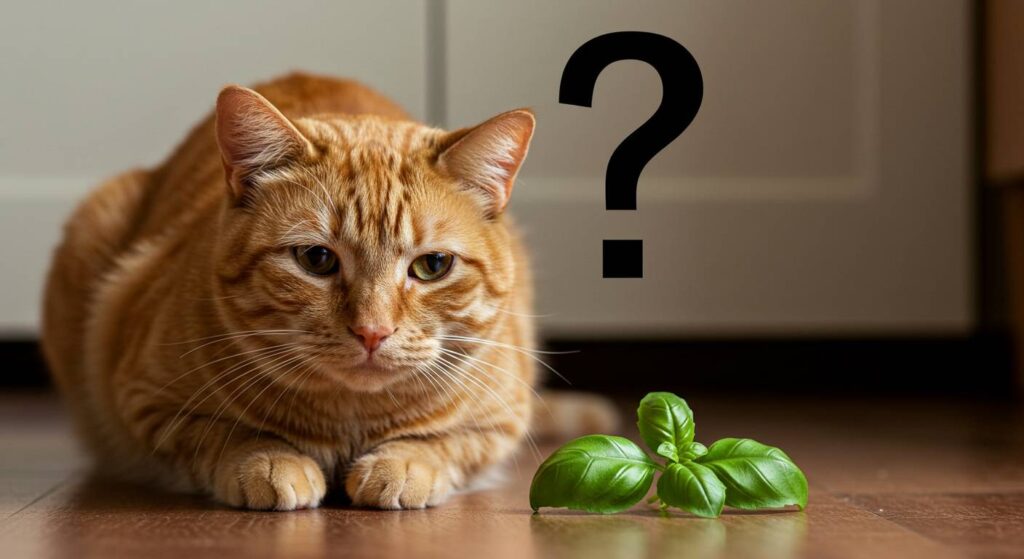
Basil and Feline Health: The Bigger Picture
Basil Cat Health: Benefits and Concerns
Let’s talk about the bigger picture of basil cat health. Are there any potential benefits? Honestly, not really. Cats don’t need the nutrients found in basil, and it doesn’t offer them any specific health advantages. The concerns, as we’ve discussed, revolve around potential digestive upset and possible sensitivities. So, when it comes to basil, it’s really a case of “no benefit, potential risk.”
Basil and Feline Health: Long-Term Considerations
What about the long-term effects of basil and feline health? If your cat is repeatedly eating basil, even in small amounts, it could lead to chronic digestive issues or sensitivities. It’s best to prevent your cat from accessing basil on a regular basis. A little nibble here and there might not be a big deal, but consistent consumption could have a negative impact over time.
Feline Basil Consumption: How Much is Too Much?
The question of feline basil consumption really boils down to “how much is too much?”. There’s no hard-and-fast rule, as every cat is different. However, it’s generally safe to say that any significant amount of basil is too much for a cat. A tiny nibble here and there is likely harmless, but a large amount could cause digestive upset. The best approach is to err on the side of caution and limit your cat’s access to basil.
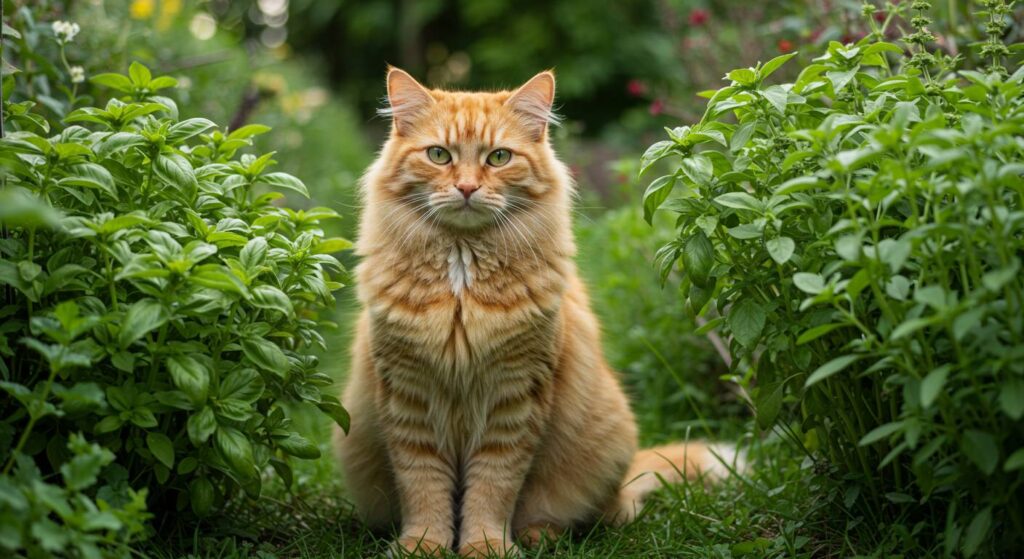
Can Cats Have Basil Leaves? Practical Advice
Can Cats Have Basil Leaves? Safe Serving Suggestions
So, can cats have basil leaves at all? The answer is not a straight yes or no. While a tiny amount of basil leaf might not be harmful, it’s not something you should actively offer to your cat. There’s no real benefit to them eating it, and the potential risks outweigh any supposed advantages. If you’re determined to let your cat have a tiny taste, make it just that – a tiny, tiny taste.
Cats and Basil Interaction: Preventing Problems
The best way to prevent problems related to cats and basil interaction is to keep your basil plants out of your cat’s reach. This might mean moving your herb garden to a higher shelf, using a cat-proof enclosure, or even switching to artificial plants if you’re having trouble keeping your cat away from the real thing. Prevention is always better than dealing with the aftermath of a cat eating something they shouldn’t.
Basil Ingestion in Cats: What to Do If You’re Concerned
If you’re concerned about basil ingestion in cats, the first step is to assess the situation. How much did your cat eat? Are they showing any signs of discomfort? If you’re worried, it’s always best to contact your veterinarian. They can provide personalized advice based on your cat’s specific situation and health history. Don’t hesitate to reach out if you’re unsure.
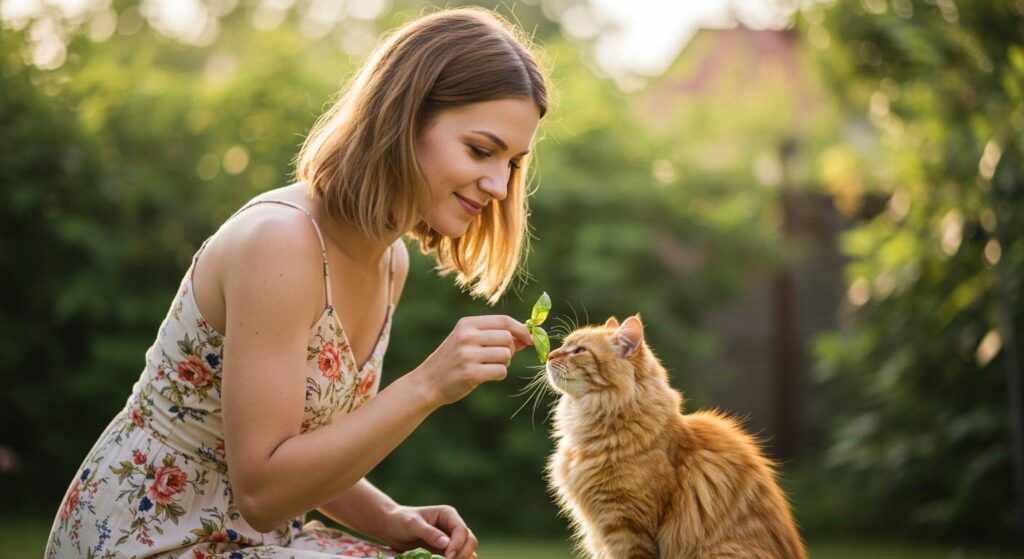
Is Basil Poisonous to Cats? A Final Word
Is Basil Bad for Kitty? Summarizing the Key Points
So, is basil bad for kitty? Let’s summarize the key points. Basil is not considered toxic to cats, but that doesn’t make it a safe snack. The main concerns are potential digestive upset, sensitivities, and the lack of any real nutritional benefit for cats. While a tiny nibble is unlikely to cause harm, it’s best to keep basil out of your cat’s reach. If you suspect your cat has eaten a significant amount of basil or is showing any signs of discomfort, contact your vet. Ultimately, when it comes to basil and cats, it’s best to err on the side of caution.
You can also learn more about are basil plants safe for cats. It’s also important to understand is basil safe for cats in general.
